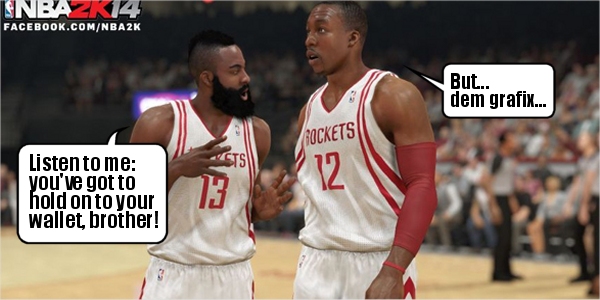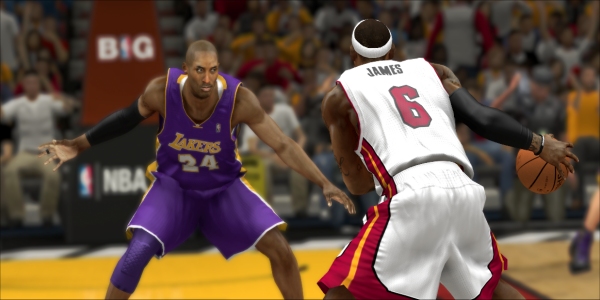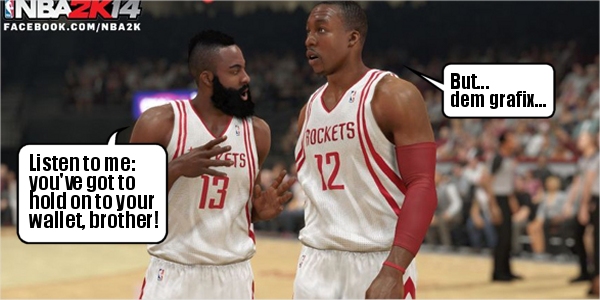NBA 2K14 Reviews Completely Skip Over Microtransaction Gouging

Your Daily Blend of Entertainment News
You are now subscribed
Your newsletter sign-up was successful
So I've just wasted my evening reading through countless reviews... well technically, they're enumerable, I'm just not in the mood to list how many I've actually read. Regardless, the point is that I had to read through many different reviews for different platforms of a single game: NBA 2k14. That's right, the golden sports goose from 2K Sports. So why did I have to read through so many reviews for such a highly lauded and highly praised game? Because “Microtransactiongate” has seeped into the new generation of home console gaming in the worst way imaginable.
Gamers have done what gamers do best when things go awry in a game's monetary business model: complain about it online. While there are many pundits who would rather gamers stay silent and take the unwarranted butt-ramming of their wallet in silent, ill-wanted appreciation, gamers refuse to sit down and let their hobby become overtaken and buried under the same philosophy of greed that ruined our housing market, ruined our national credit rating and essentially helped put tens of millions of Americans out of work. Yeah, gamers have the back bone that apparently the rest of our society lacks (or is too lazy to adopt).
Regardless, gamers made it known that there's something terribly wrong with the highly praised but deeply flawed NBA 2K14. What's so wrong? The microtransactions.
While nothing is inherently blocked and locked entirely behind a paywall like the blatant act of anti-consumerism by Capcom with Street Fighter X Tekken, the game adopts Turn 10 Studios' recent paradigm of redesigning a game around a grind, which is exactly what happened with Forza Motorsport 5.
“What's so bad about grinding in a game?” you ask. Well, grinding in games is nothing new nor nothing so burdensome that it can inhibit gamers from having fun. However, when a game is purposefully designed around a grind that's so tedious that players become frustrated enough – either due to cutting down on time spent grinding or becoming bored with the way the game adopts an addictive measure of repetition in order to achieve "success" – that they would rather spend real-life cash than play the game, something is wrong. One gamer best described it as “Paying full price for the game and then paying more money to not play the game.”

In the case of NBA 2K14, the game has been tailored around virtual currency to do all sorts of things, from trading players to firing coaches to rearranging your team. Everything requires virtual currency, and even though it's something one reviewer from one major game site acknowledges, none of the other reviewers seem to have taken up any kind of aversion to the fact that NBA 2K14 is designed on the long haul like a free-to-play MMO.
This sort of cash-shop creep mentality seeping in from the dirty crevices of the worst kind of cash shop manipulators in the free-to-play space and into the premium, $60 retail model is an egregious and dirty tactic that works to undermine gamers by taking advantage of their eagerness to play, and their willingness to part ways with cash to support what some might consider a short form of addiction. It's the fee-to-play model and it's getting worse by the release.
Your Daily Blend of Entertainment News
We were, in no uncertain terms, warned about this sort of tactic from the AAA publishers in a trollish prophecy by Cliffy B., after Microsoft reversed their DRM policies. The Gears of War creator basically laid it out that gaming would either require relentless forms of pervasive microtransactions or gamers would have to give up their rights of ownership with equally pervasive DRM machinations.
What's funny, though, is that gamers have come to terms of recognizing these tactics – tactics, I might add, that have also helped ruin some features of games like the NHL series from EA, and, to an extent, Grand Theft Auto Online. Gamers who have complained about this issue have been told to either not buy the game or do their research about the product before buying it.
However, as I mentioned in the article about the reviewers failing at their jobs with Total War: Rome II, how can gamers do proper research when reviewers seem to be completely oblivious to these issues and fail to mention them in their reviews?
Despite having a thorough and well-rounded take on the game, the Joystiq review for NBA 2K14 makes no mention whatsoever about the microtransactions. Alex Navarro's review at GiantBomb glances over features and gameplay, focusing mostly on the revamped career mode – much like Joystiq – but still no mention of the microtransactions.

The Official Xbox Magazine is one of the worst offenders, not only having a small and uninformative review, but one would think that it would at least mention a few of the microtransaction issues that players are running into? Nope. No mention at all. There's almost nothing there in the review that would help anyone make an informed purchase about the game and reads closer to a hands-on preview than a review. It almost makes me question if they even played the game?
Ryan McCaffrey from IGN had a rather detailed review of the gameplay, though it was generically sparse when it came to anything beyond all the checkpoints of a typical review summary.
And while Gamespot's Tom McShea easily has one of the more entertaining and solidly engrossing reviews, he only glosses the issue of microtransactions, mentioning in passing that...
"Why do I have to earn the ability to tweak lineups? I'm the general manager, darn it, and I can fire the coach if he questions me. The same contrivances exist when improving your player in My Career. My three-point shooting doesn't improve when I spend time in the gym or drain a clutch corner jumper. No, I have to spend points in that stat after the game. Yes, raising my character from benchwarmer to starter is empowering, but just imagine if I could improve based entirely on how I played.”
That doesn't really address the issue at hand, of course. Although, in all fairness, the issue he raises about stats versus having fun is a very interesting topic worth discussing at another time.
Moving on... Game Informer was the only major review site that actually addressed the stress of grinding for VC (virtual currency) through simulating games, and noted in the review that...
“By simming, you can only earn the paltry amount of VC awarded for completing the ownership goals. This leaves you at a major disadvantage when it comes to upgrading your abilities, spending VC on player improvements, or responding to the wishes of your coach. Rick Adelman constantly requested that I build a film room so the players could study, but in three years of managing the organization via simming I still didn't have enough VC to even unlock the ability to buy new facilities.“
Again, though, this doesn't directly address the elephant in the room: how much playtime is required for players to grind to get the items they want? How much grinding is required to enjoy the game longterm? This issue was highlighted in an excellent post regarding the Forza 5 microtransaction issue over on a blog post on Giantbomb, breaking down the real cost of purchasing vehicles from Turn 10's latest title.

One would also think that mobile app reviewers would be more prone to breaking down the cost of microtransactions, given that there's a deep proclivity in the mobile space for all things cash shop-related. However, despite doling out lower scores for NBA 2K14, reviews from Modojo, Applenapps and PocketGamer are all more concerned with graphics over gameplay. In fact, majority of the reviews spend a good deal of time explaining how graphics affect immersion, and how important and great the graphics are in the game. Oh hey, wasn't there a big issue about graphics not mattering as much as gameplay?
Ironically (if you really want to call it that), gamers have been trying to warn other gamers about NBA 2K14 and its microtransaction issue; taking the discussion to forums and even fairly reviewing the game on Metacritic while leaving common-sense-criticisms out and available for everyone to see, like user lovabledingo, who stated...
“VC system is in every aspect of this game. Why pay $60 tax for a game when you have to pay, or play at an incredibly slow pace. On average im earning 150-200 vc per myplayer game when alot of things cost in the thousands.”
Another user wrote in the user review section of the Xbox One version of the game, going by the handle of Scotty86, writing...
“Like all things great things before it, NBA 2K14 gives in to corruption and greed. This is in the form of VC, yet again 2K have found ways to squeeze extra hard earn money out of it's players. Casual users can't unlock and enjoy features easily and although the game is "hardcore" you need to apply to game to your fan base.”
Sadly, game reviewers don't actually play games to enjoy them or because they enjoy them; game reviewers play games to burn through the eight-hour playing experience to churn out a 7 through 10 review (or in rare cases, something 5 and below just to show they can still be fair and balanced).
Many of these reviewers probably never noticed the hardships of the VC grind because 1.) 2K's PR may have provided game currency for them to help speed them through the process, or 2.) they just didn't play long enough to get to a point where grinding was required.
In short, many of these reviewers aren't going to talk about the grind/micrcotransaction in a game when they won't be returning to it. If they don't invest (or plan to invest) 40 hours into the game they obviously aren't going to review content the same way a gamer who put 40 hours into the game would.
Sadly, I get the feeling we'll be seeing a lot of this dissension between gaming media and gamers throughout the eighth generation of home console gaming.
Unfortunately, the real losers in this scenario are gamers who just want to gain trustworthy information about games, and to be thoroughly informed before they commit to a purchase.
Staff Writer at CinemaBlend.

